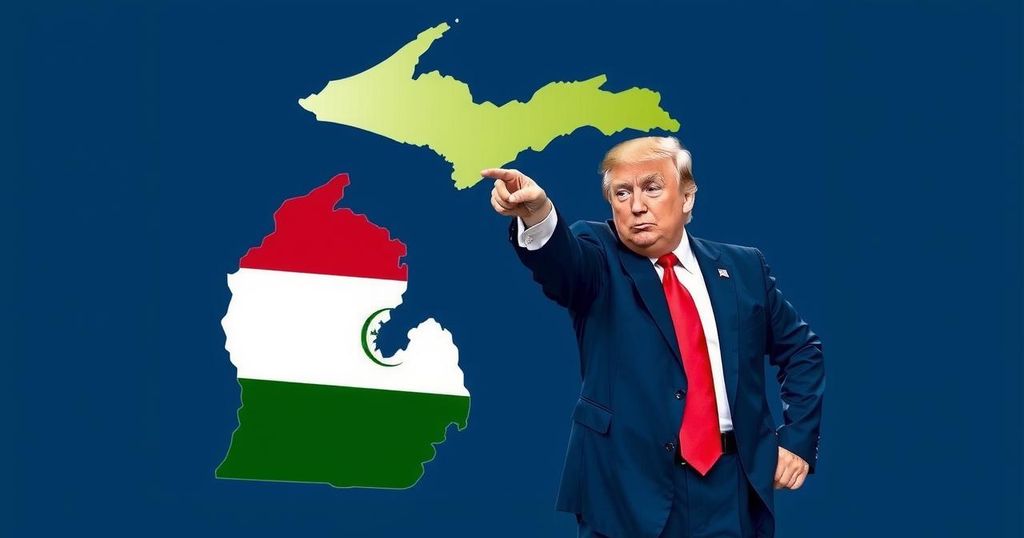The Shifting Political Allegiance of Arab Voters in Michigan Towards Trump Ahead of 2024 Elections

In Michigan, Arab American voters are increasingly supporting Donald Trump in reaction to perceived neglect from the Democratic Party, particularly regarding U.S. policies on Israel amidst the ongoing conflict in Gaza and Lebanon. Activists argue that the Biden administration’s continued military support for Israel has alienated many, prompting a political shift that may have significant implications in the upcoming elections.
In Michigan, particularly in Dearborn, a city with a significant Arab American population, an unexpected political shift is occurring as many Arab voters are turning their support towards Donald Trump ahead of the upcoming United States elections. This change is largely driven by discontent directed at the current administration, particularly towards Vice President Kamala Harris, due to the Biden administration’s unwavering support for Israel amid ongoing hostilities in Gaza and Lebanon. Activists within the Arab community argue that historically, Democratic candidates have taken their votes for granted, and this election cycle may lead to consequences for perceived disregard towards their concerns. Samraa Luqman, a Yemeni American activist, has expressed her intent to hold the Arab community accountable if Harris loses to Trump, attributing the potential defeat to Democratic negligence regarding Middle Eastern policies. She stated, “It is because of this community, it is because of Gaza and because of the genocide, that you lost.” For many, including Luqman, supporting Trump symbolizes a pragmatic gamble in light of the ongoing violence; even if their concerns about Trump’s past rhetoric remain, they perceive a chance for change as more substantial than a continuation of current policies. As Trump visited Dearborn, local leaders and businesses welcomed him, contrasting previous narratives that depicted the city negatively. Business owner Albert Abbas articulated the community’s frustration towards existing political avenues that seem to prioritize other interests above human lives, saying, “I can’t stand in silence when Palestine is being erased. Please help us stop the bloodshed.” While supporters of Harris argue the vice president will not perpetuate Biden’s policies, they face skepticism as she has not distanced herself from the administration’s stance on Israel. The political landscape for Arab Americans appears to be shifting under the reality of current events, showcasing a divide that Trump appears eager to exploit. Several local leaders, influenced by conservative social policies and a desire for change, have endorsed Trump. Yet opposition remains strong, as evidenced by local voices emphasizing prospective dangers tied with supporting a candidate with a history of divisive rhetoric toward Muslims and Arabs. The emerging sentiment suggests that Arab Americans may play a crucial role in determining the outcome of a closely contested election in Michigan. As these dynamics unfold, the implications on traditional voting patterns and future political engagements by the Arab American community underline the potential for a significant and consequential electoral bloc that demands attention and respect.
The article discusses the shifting political landscape for Arab American voters in Michigan, particularly in Dearborn, a city with a sizeable Arab population. Traditionally, this demographic has leaned towards the Democratic party; however, recent events, especially the Biden administration’s policies regarding Israel during conflicts in Gaza and Lebanon, have caused dissatisfaction. The piece highlights how activists and local leaders are reconsidering their political alliances, seeing a potential shift towards supporting Donald Trump despite his previous controversial remarks regarding Arab and Muslim communities. Additionally, figures like Samraa Luqman articulate a developing consensus that Democratic leaders have taken the Arab vote for granted, reflecting a broader call for accountability in future political actions.
In conclusion, the growing support for Donald Trump among Arab voters in Michigan, particularly in the face of perceived neglect by Democratic leaders towards essential issues in the Middle East, signifies a pivotal shift. This developing electoral trend, motivated by discontent with the current administration’s approach to Israel and strategic political calculations within the community, highlights the potential power of Arab Americans as a decisive electoral bloc in the coming elections. As the discourse evolves, it serves as a warning to all political entities regarding the importance of addressing the concerns of diverse communities.
Original Source: www.aljazeera.com








